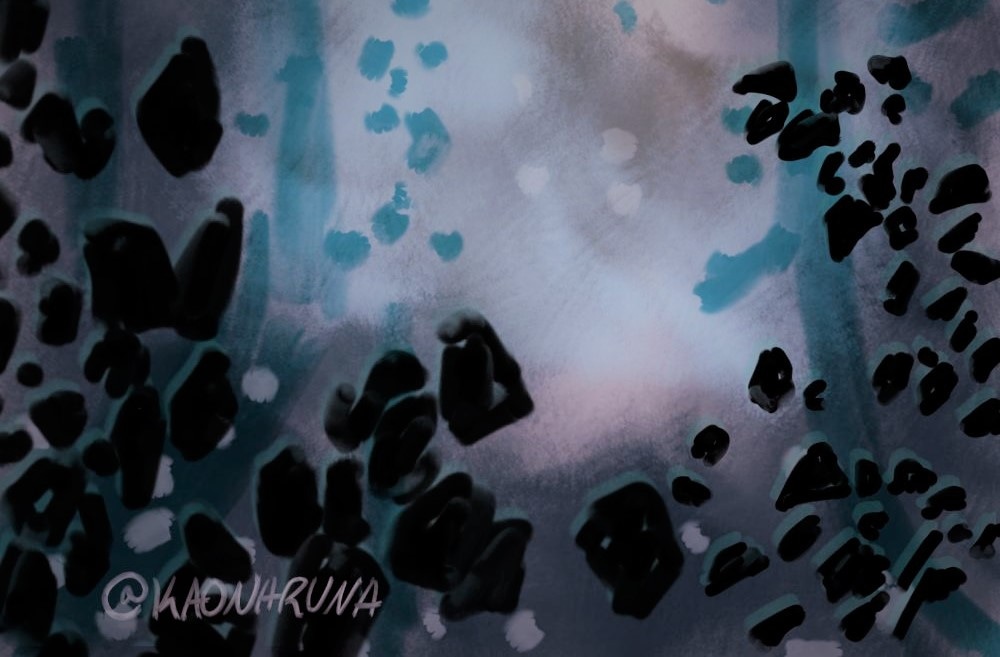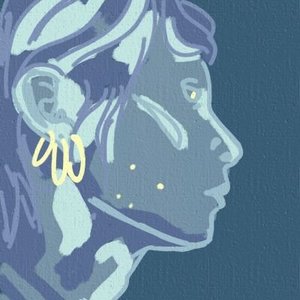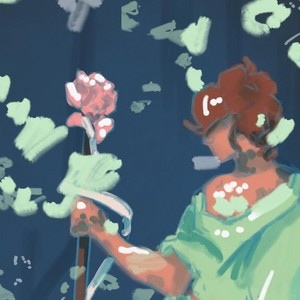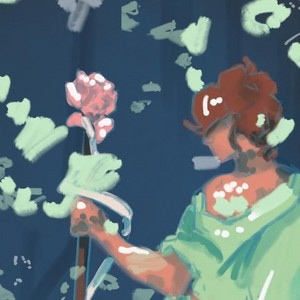3
There wasn’t any light to be heard of. The night was warm and insulating, fires were, by then, a nuisance. Xevla sat awake in a world of dreams and peacefulness, stale air parading though his lungs. It was too hot to sleep, by his taste. Nothing had been accomplished, the day wasn’t over.
There’s an odd phenomenon you find, when you come to fixate on something so heavily. Maybe, it’s nothing at all—but it could be anything. If you can’t see it, how can you be sure that it exists? Or more importantly, that something doesn’t exist. That’s what investigation was for, persons directing order, professors, scholars—yet, all were dismissive and confident in the lack of “something.”
Toying with a sharpened file, he deliberated. No one would mind, if he did—surely, no one would give a damn at all. The vines and trees grow so quickly here, any damage performed would be recovered in no time at all, hardly a blink and the world would just keep turning.
He’d convinced himself, to pry back the curtain. He’d prepared himself for every disappointment nonetheless, because it’s likely he was overreacting, fixating on nothing. He had to check. Xevla had to know, for certain.
He felt his way out, following the directional stones, along with the exceptional map drawn out in his memory. Nothing ever changed, or at least it always seemed that way. People came, people went, but nothing faltered or changed from its place of belonging. Thus, it was so very easy to lead to the center of Xevla’s world—alerted by the stray wisps of grass along the sidelines, barefoot, when he began to stray. As he approached, that faint, colorless light suggested the way to him—though so small, it was useless by the time it was notable. It seeped through the imperfections in the foliage, the younger sprouts glowing softly, in their partial translucence. All light has a source, Xevla thought—there must be something inside.
Resisting the urge to blindly hack and slash at the covering, he felt for weak points, digging his hands into the tight crevices between plants. There was some give, though not nearly enough to make the effort worthwhile—the younger were much more pliable, though aged examples were set in their position. It was only then that he knew for sure—he’d have to damage and kill that which he adored. But, he rationalized—everything will grow back with time, given renaissance by the next rain.
Holding that file, the poor man’s metal it was, Xevla felt for a younger, weaker portion of the walls before him. Carefully then, he’d force through the bases, peel down the springy material in loose sheets. The light grew as he would, pouring out from the structure’s core. He didn’t want to expose too much, luminate the town in such an unnatural way—it was as if the sun had locked itself away within the very leaves it was born to nourish. Though once there was just enough, Xevla forced himself through the gaps, into the reserved and rather claustrophobic space behind nature’s curtain.
It was bright; not enough to blind, though enough to see the one’s surroundings in a bit too much detail. Xevla wasn’t sure what he anticipated. There was evidence of previous, comfortable living there. A wooden table, snapped and mangled by wind-shaped vines deformed the ground, along with warped and misplaced floor tiles. Everything recognizable was in shambles, strewn into the hands of time, and the consequences of being forgotten. The earth had overcome the inhabitant’s need to control it, and reclaimed its space, to say the very least—and somehow, that hidden destruction had become an object of public admiration.
The ceiling lowered by decay and many plants’ weight, he’d take extra care not to bump himself on irregularities; he’s already watching himself on older doorways, height isn’t always a bonus. But aside from that, he was well capable of recognizing the basic conventions of a living quarter. It was a time capsule that represented a lack of change, rather than the pass of time—aside from that light.
That light, she poured from a root cluster, twisted out of rotted wood—too old and dry for even the most desperate of larva to ravage. It may have been a fixture of some kind, perhaps. The wood itself didn’t appear to sprout from anywhere, nor did it clearly have any carved away portions to its structure; it may have lost anything identifiable to time itself. From there the light came, embedded in it all, tethered to the earth in some fashion. Xevla felt called, as if there were some quiet hum whispering to him an invitation—though rational would call it foolish curiosity.
Central, though nearest the ground, Xevla had to kneel to best approach the source. As you’d expect, all became more blinding as he came near, to the point where not even the wood and vine were within visibility. In this moment of blindness, steadying himself on the varied and unpredictable floor—Xevla reached into the epicenter.
The light disappeared in an instant, leaving him in pitch blackness. That outstretched and calloused hand fumbled still for the source, especially now that it had no reference point. Pricking himself a few times on a mismatched array of thorns are splintered wood, something smooth would at last graze his thumb. It was rigid enough, not wood nor plant, but stone.
It didn’t have the usual abstract shape. Touching it, focusing on the shape, Xevla tried to pry it free, if it would dare move.
It came so willingly, a warm presence into open arms—though as it pulled free, the air went stale, metallic in taste. The sound of its freeing sounded not only like tearing, but like ropes pulled taut and brought to tension. Only then, would any discernable light return—the faintest of sorts, just enough to see precisely what it is he held. There lay a soft, dusty rose crystal of sorts. It hadn’t any sharp edges left, worn down and dulled, releasing a fragmented light through frosted glass.
“The hell is this?” Xevla broke his silence, muttering quietly as he squinted, rolling the piece around his hands.
Though the object was as foreign as any other, it struck a chord of familiarity within Xevla. There was something right and just about establishing contact with it—though the task to obtain wasn’t grand, the reward was nothing he’d imagined. Even as he understood that what he held appeared to be not but a glowing rock, many questions still remained. Only deliberating for a moment, he’d slip the prize into the folds of his garb, alongside the file that took the journey. It snuffed out the light, it couldn’t break through the thick cotton. Figuring it late, and seeing no reason to persist, Xevla decided it was best to leave—he knew not how much time had passed, could have only been an hour, maybe much more. Thoughts trampled rationality for a moment here and there. But, in all, he’d got what he came for.
Feeling for the exit as he rose, he struggled to find the cuts initially stepped through. As he reached behind him, the path he’d imagined became obstructed by new tendrils of plant. The more he searched, though fixed in position, the more his arms tangled in springy, young vines. As his imagination ran wild, adrenaline bubbling to the surface, Xevla felt as though the earth began to grow into him. His body suffocated, and though he tried to step away, even his feet became immobile.
A copper taste in his mouth, the air thinned. Over the moments that followed, in silent panic, Xevla was overwhelmed, overcome by the world—swallowed in the very flora he once prided in feeding.












Comments (0)
See all